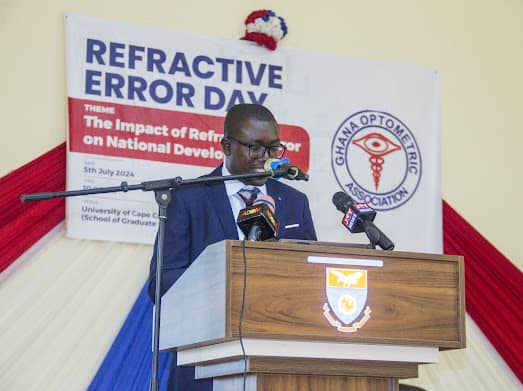Optometric Association Launches ‘World Refractive Error Day’

The Ghana Optometric Association, has launched the Refractive Error Day with a call on policymakers to initiate efforts to ensure spectacles acquisition is put on the National Health Insurance Scheme.
Speakers at the occasion, indicated that putting a minimum eyeglasses cost on the NHIS list, would ensure patients who needed spectacles had them.
They also urged managers of the scheme, to consider spectacles for eye patients, as an item on the scheme to prevent many people from going blind.
The association, has also indicated that many patients are having worsening eyes cases, because they could not afford prescribed spectacles.
The occasion which was themed, ‘’The impact of refractive error on national development’’, was also used to unveil a logo for the day’s celebration.
An Associate Professor at the Clinical Optometry, School of Allied Health Sciences, University of Cape Coast, Prof. Samuel Kyei, indicated that many who suffered refractive error are mostly the poor who could not afford prescribed spectacles, therefore leading to worsening eye conditions and possible blindness.
He said, while the disease had an immense socio-economic impact on the country, many stakeholders have done little to reverse the damage it is causing.
‘’It is essential to undertake extensive education on refractive error, while implementing measures that make it flexible for patients to access quality eye care services”, he noted.
Prof. Kyei, therefore called for incentives to attract eye care professionals to rural communities to impove equity in service accessibility.
He stated that it was time to invest in refractive error research to collect data for proper policies and planning.
A senior Lecturer at the Optometry and Visual Science Department of the Kwame Nkrumah University of Science and Technology, Dr Kwadwo Owusu-Akuffo, stated that the impact of refractive errors and eye diseases had dire consequences on the economy, reducing academic performance and productivity.
He observed that, though the National Eye Health Programme, had provided a strategic framework to address vision health, including refractive errors to reduce the prevalence of visual Impairment through early detection and management, more could be done through public awareness campaigns, training of eye care professionals and the provision of affordable corrective lenses.
On his part, the outgoing president of GOA, Prof. Bert Kusi-Boadi, said the refractive error day had come to stay and would be used to create awareness of the disease, its management and correction.
He called on stakeholders to collaborate to effectively support patients and create awareness.
Source: Anchorghana.com




